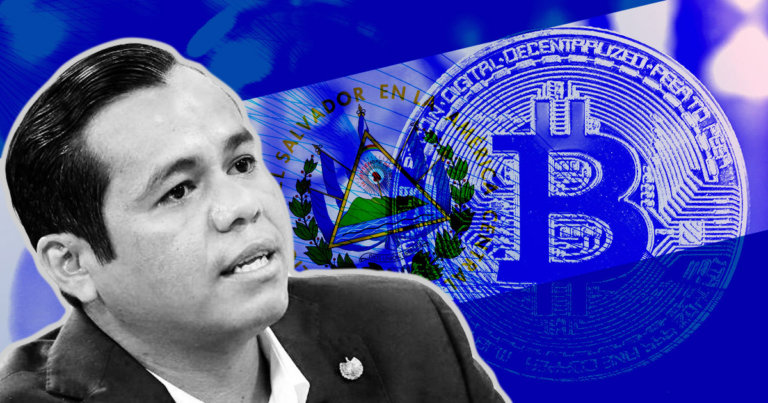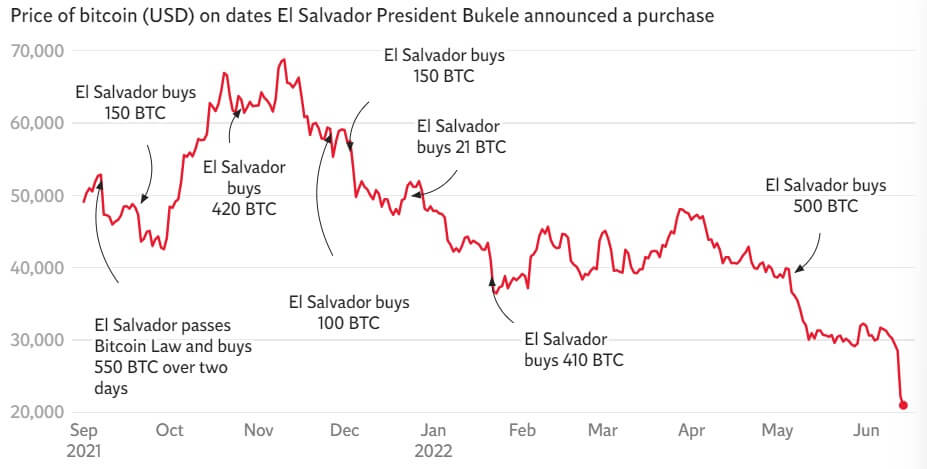 El Salvador’s minister dismisses Bitcoin crash despite 50% loss in reserves
El Salvador’s minister dismisses Bitcoin crash despite 50% loss in reserves El Salvador’s minister dismisses Bitcoin crash despite 50% loss in reserves
El Salvador has collected over 2,300 Bitcoins since 2021. Even though the county lost more than $50 million with the recent crash, it's finance minister says the risk is extremely minimal.

Cover art/illustration via CryptoSlate. Image includes combined content which may include AI-generated content.
El Salvador’s Bitcoin reserves diminished by 50% and lost more than $50 million with the recent Bitcoin price fall.
Despite their gravity, El Salvador’s Finance Minister Alejandro Zelaya said the losses pose a minimal fiscal risk.
El Salvador bought over 2,300 Bitcoins at different prices after accepting the currency as a legal tender in September 2021.

Since then, El Salvador earned and lost in the short term. Both the Finance Minister and the President of El Salvador have been blamed for damaging the country’s financial health. However, Minister Zelaya confidently responded:
“When they tell me that the fiscal risk for El Salvador because of Bitcoin is really high, the only thing I can do is smile”
Bitcoin adoption in El Salvador
The International Monetary Fund (IMF) criticized El Salvador’s decision to accept Bitcoin as a legal tender and strongly advised against it. The IMF report listed the drawbacks of Bitcoin as:
“[Bitcoin] entails large risks for financial and market integrity, financial stability, and consumer protection. It also can create contingent liabilities.”
However, the country dismissed the IMF’s warnings. The country’s president and the finance minister are strong pro-Bitcoiners who believe Bitcoin is the future.
Moreover, Bitcoin reduces the country’s dependence on the U.S. Dollar, which is El Salvador’s only other official currency.
Highlights since adoption
In addition to believing in Bitcoin, the country already saw the positive impacts of adopting Bitcoin as a legal tender.
One month after legalizing the currency, the country generated some short-term revenue which was enough to build 20 new schools to educate society about cryptocurrencies.
Within a few months of adopting Bitcoin, El Salvador’s tourism sector boomed by 30% and generated more than $1,400 million of income.
Future Plans
To increase the Bitcoin adoption in the county, El Salvador is building a “Bitcoin City.”
The architectural model of the city shows that it will be placed near the Conchagua Volcano, taking up most of the hills. The city will also have a hexagonal center, an airport, and various key landmarks.
The county started working on the city as soon as it accepted Bitcoin as a legal tender in November 2021. El Salvador’s president posted the city’s model as an update in May 2022. For now, it is unknown when the construction will begin.
The geothermal energy the Conchagua Volcano provides will also be utilized in sustainable Bitcoin mining.
The Central African Republic
Following El Salvador’s footsteps, the Central African Republic (CAR) also adopted Bitcoin as a legal tender in April 2022.
The CAR’s President Faustin-Archange Touadéra expressed his fondness of Bitcoin and said:
“For us, the formal economy is no longer an option. An impenetrable bureaucracy keeps us stuck in systems that don’t give us the opportunity to be successful. Bitcoin opens a new path to a bright future.”
The IMF criticized CAR’s decision immediately after accepting Bitcoin as a legal tender. The IMF raised similar concerns to those it raised to El Salvador regarding volatility and integrity.
However, it wasn’t enough to convince CAR to revoke its decision. The country is currently working on establishing Africa’s first legal Bitcoin investment platform.




 Arkham Intelligence
Arkham Intelligence 

 Farside Investors
Farside Investors 
 CryptoQuant
CryptoQuant 
 CoinGlass
CoinGlass 


































































































